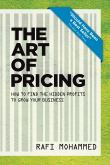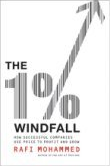Guest Editorial: Gas Prices are Unfairly High! (Or Maybe Unfairly Low?)
I’m pleased to present the first guest editorial blog on PricingForProfit.com. Sarah Maxwell is a good friend, Associate Professor at Fordham, and author of the insightful new book, The Price is Wrong. Please enjoy Sarah’s thoughts on fairness and gas prices.
The consumer at the pump is mad. They are mad because the price of gasoline is unfair. They think the price unfair not only because it is so high and getting higher but also because the oil industry acts unfairly. It is unfair for the CEO of Exxon-Mobil to earn in a day enough to float four families for a year. That is not equality. We think it is unfair for gas companies to charge different prices to people in different zones. That is not equality either. We think it is unfair to sell expanded “hot” gas. That is taking advantage of our ignorance. And we think it unfair for prices to be controlled by a monopoly. With a monopoly, buyers have no choice. They have to pay what the monopolist demands – especially when the product is one that the buyer needs.
In the United States, we see gasoline as a need. We have to have gasoline to get to work and make a living. Our whole system is based on the automobile. Outside of a few east coast cities, we have little alternative means of transportation. So we are stuck, and that is not fair.
My new book, The Price is Wrong, opens with the unfairness of gasoline prices. And I stand behind every word. But in all fairness I have to point out that there is another side. Certainly, one can make the case that gasoline prices are unfair because they are too high, but it can also be argued that they are unfair because they are too low.
For example, compare gas prices in the United States with those in Europe. The price of gasoline in Europe (as of February 18, 2008) was nearly three times what it was in the United States. One would expect Europeans to protest. After all, researchers have shown that fairness perceptions are often based on what we get or pay compared to what others get or pay. And when the comparison is negative, we get mad. We get emotional.
But, surprisingly, Europeans do not complain – at least not too loudly. The reason is a combination of circumstances and beliefs. Unlike the United States that was built largely around the automobile, Europe was built around public transportation. Europeans therefore have an alternative to the auto. Gasoline there is not a need. Europeans evidently consider gasoline a luxury. And both Europeans and Americans agree that luxuries should be taxed. So in Europe, even though the price of crude oil is the same as in the United States, people accept a much higher price at the pump. From the European viewpoint, the price is fair, at least fair enough.
Another reason that Europeans do not complain so much about gas prices is that they are protected: the larger percentage of tax in their price of gasoline buffers them from the shock of higher oil prices. Even if oil prices doubled to $200 a barrel, the cost of gasoline in Norway would increase by only some 25% (assuming refining, distribution and taxes remained constant) whereas it would increase by roughly 50% in the United States.
Europeans also accept the high price of their gasoline because it generates necessary tax revenues for not only maintaining roads but also supporting alternate forms of transportation. In the United States, however, our gasoline taxes are insufficient to support our roadways. Our bridges are collapsing. Our toll roads are being leased to foreigners. And our pot holes are an embarrassment as well as a danger. So maybe our gas taxes have to be increased. Perhaps we should consider the terrible thought of actually paying more for gasoline, not less. Such a major shift in attitude in the United States may seem unthinkable. But if we could change our attitude toward smoking, we can change it toward taxes on gas.




